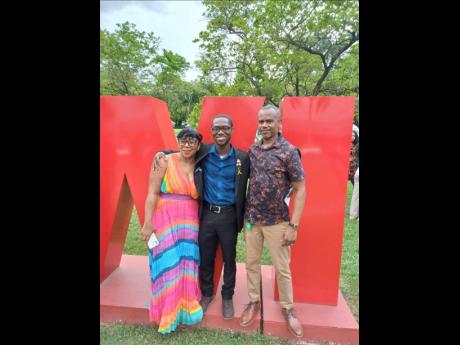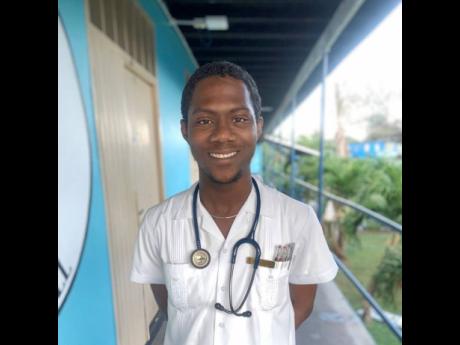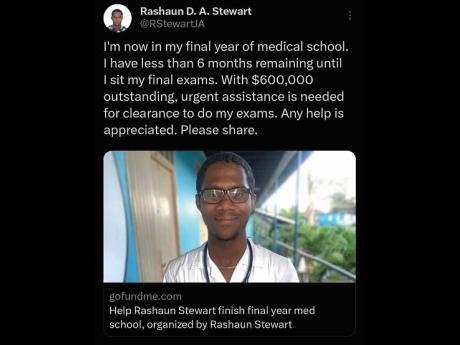Social media users rescue Rashaun Stewart’s dream
Assistance through X helps student get past financial struggles to become medical doctor
Unlike other individuals who might fall into depression under the weight of student debt, when the burden became too heavy, Rashaun Stewart went to social media platform, X, to appeal for help.
Even with numerous scholarships already in the bag, Stewart, a final-year medical school student at the time, was earlier this year blacklisted for owing some $700,000 to The University of the West Indies (UWI), Mona.
The 23-year-old from the inner-city community of Mount Salem in St James said he has been determined, since his time as a student at Cornwall College, that nothing would block him from becoming a medical doctor – not even his pride.
“You would ask why I went to Twitter (now X) and started a GoFundMe and so on. I’ve always been very active on Twitter and social media sharing my story and my journey. I think a major part of why it is that I was actually accepted to medical school is because I shared the story and [got] support in tangible and intangible ways, so that the path was ultimately cleared,” Stewart, now a medical doctor, told The Gleaner.
“I, having that experience with the power of social media/the transformative nature thereof, I rationalised that perhaps it’s best to just use a very popular social media app that I’m already active on to further emphasise the need for support and the gamble ended up paying off favourably. Big dividends actually,” he said.
Stewart has had first-hand experience with how daunting the academic journey can be when coming from humble beginnings, coupled with being from a community affected by high levels of crime and violence. He grew up in Mount Salem, the first community to have been declared a zone of special operations – a crime-fighting strategy and intervention effort established by the Government in 2017.
He attended Cornwall College for seven years and in 2019, after completing his high school education, applied to The UWI, Mona, to pursue a Bachelor of Medicine and Surgery (MBBS). However, he told The Gleaner, that was when the real-life struggles started for him.
“Honestly, I have always wanted to do medicine, and I resolved, from the time I was in high school, that I would let nothing stop me and there was no barrier that would be impossible for me to surmount in getting to the end goal of becoming a medical doctor,” Stewart told The Gleaner.
WORRIED ABOUT BURDEN OF LOAN
“In the beginning stages of my application to UWI, my family and I contemplated and applied to the Students’ Loan Bureau. I was actually successful there, but I hesitated in actually accepting the loan, because I wanted to graduate debt-free, as I’ve heard horror stories of how difficult it is to pay off student loan and the various expenses on a monthly basis,” he said.
But, even with his first major roadblock in life, he did not give up on his dream.
“I hail from a family of humble means and we weren’t able to afford the US$20,000 fee per annum. As a consequence of that, I failed an assessment metric done by the university called the financial means test, which essentially determines a prospective applicant’s capacity to pay for the full tuition,” Stewart said.
“So, having failed the means test, I was rejected from the MBBS programme. It was clarified by the admission’s section late that week of having received the rejection notice, that I was not rejected on the basis of not having academic requirements, but rather, purely financials. It was devastating, and it seemed like the journey was over for me before it even began, but God always comes through in the moments we least expect, and He is always fortuitous in His timing, so I received a government scholarship shortly thereafter that paved the way for me to gain admission.”
Stewart got additional scholarships within the first semester of medical school from the Much Aspired Much Achieved Foundation based in Florida, and others. In his third year, he received scholarships from Sagicor Foundation and Carreras. He also received a grant from his member of parliament, Marlene Malahoo Forte.
Stewart was also named a TVJ Schools’ Challenge Quiz Scholar for his team’s outstanding performance in 2019.
“All of them put together covered the fees – tuition, hall of residence fees, miscellaneous fees and others – to the extent that I had over $700,000 in surplus that was carried over into second year, and then in second year, I had another surplus that rolled over into my third year, all the way up to year four,” Stewart said.
FINAL-YEAR FINANCIAL PRESSURE
“All the money rolled over to year four, and year four is when the financial struggles really magnified quite a bit, because, at that point, I wasn’t receiving scholarships as I had in the first years of medical school, and every year, since starting, the tuition increased with the increase in the exchange rate altered, as the tuition is quoted at US$28,000 ... Halls of residence fees also increased [over the five years] and miscellaneous fees and other expenses,” he said.
He paid a total of $3.7 million in 2019 from the scholarships but, by the time 2024 came, the total tuition cost climbed to over $4.4 million, which pushed him to go to X and appeal for assistance through a GoFundMe page.
“I was in quite a financial pickle, given that I had to pay off the fees to sit my final MBBS and I did not even receive clearance initially to sit the final MBBS up until a week after clearance was [to be] issued. I started a GoFundMe. I got all the funding that was required. I paid off my fees and transitioned into final year and all was well,” he said.
His online plea also resulted in his Hall of Residence’s Gladys Myer’s Educational Fund giving him a $400,000 scholarship.
NEW MODE OF LEARNING
For Stewart, the financial concerns were not the only issues he had to contend with during his studies. He was pursuing his MBBS when the pandemic hit, and had to pack his belongings that were on campus and return to his home in St James where he would do online classes – a new and strange mode of taking on a practical programme.
“I ended up not returning to the face-to-face modality until October 2021. I spent a year and more at home navigating medical school virtually ... . I had to do labs online ... and it was rather difficult because I’d never been in an online system and doing med school in an online modality is exceptionally challenging,” Stewart said.
“There were times when the platforms clashed and there were no facilities to attend classes. There were times when, while doing exams, electricity went at home. I had Internet outages. Also, there were times, in terms of the questions, they were not being displayed appropriately. Some questions were missing. It was a lot, and it really hampered our learning.”
Stewart said he was happy to return to face-to-face classes and hospital experience in his third year when the orders and restrictions under the Disaster Risk Management Act were lifted.
Additionally, two persons close to him died, which hit him hard.
“My grandma unfortunately took ill while I was in my first year of medical school, and when I returned mid-way through [university], she was ill up until her passing in 2021. She ended up passing just a few days just before my exams, and the funeral was actually two days before my exams at the end of semester one of third year,” Stewart said.
“So that threw me off quite a bit. I wasn’t in the best frame of mind and it showed. Thereafter, I had a friend of mine who was studying overseas. He was involved in a fatal car accident when I was in fourth year, and ended up passing ... and I had to contend with that.”
On July 17, Stewart proudly went back to X, the social media platform he first went to for assistance, and posted a new image informing X users that he is now a medical doctor, thanks to their assistance and others.
He is elated to have overcome the odds.
“Now that I’m done and I’m on the other side, I realise that the struggles only served to help make me stronger and all good stories feature conflict and resolution, and all those conflicts are what helped to shape me into the person I am today. It helped to drive the development of certain personal characteristics and, honestly, stormy seas make for the best sailors,” Stewart told The Gleaner.
“I’m glad to have gone through all of that and come out stronger and I have no regrets. I look back and I’m happy, satisfied with how the journey has unfolded so far, and I look forward to what will come in the future,” he said.



